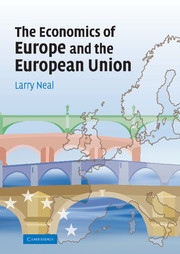Book contents
- Frontmatter
- Contents
- List of figures
- List of tables
- List of boxes
- Part I The economics of the European Union
- Part II The economies of Europe
- 12 Germany: problems with reunification
- 13 France: problems with assimilation
- 14 The United Kingdom: after Thatcher, what next?
- 15 Italy: political reform versus economic reform
- 16 The small open countries: free trade or customs union?
- 17 The Scandinavian union: or separate ways?
- 18 The latecomers: lessons in preparation
- 19 The newcomers: building institutions
- 20 The future members: customs union as substitute or stage one for the EU
- Suggestions for further reading
- Index
20 - The future members: customs union as substitute or stage one for the EU
Published online by Cambridge University Press: 05 September 2012
- Frontmatter
- Contents
- List of figures
- List of tables
- List of boxes
- Part I The economics of the European Union
- Part II The economies of Europe
- 12 Germany: problems with reunification
- 13 France: problems with assimilation
- 14 The United Kingdom: after Thatcher, what next?
- 15 Italy: political reform versus economic reform
- 16 The small open countries: free trade or customs union?
- 17 The Scandinavian union: or separate ways?
- 18 The latecomers: lessons in preparation
- 19 The newcomers: building institutions
- 20 The future members: customs union as substitute or stage one for the EU
- Suggestions for further reading
- Index
Summary
Introduction
The European Commission seriously considered the possibility of including Bulgaria and Romania in the clutch of accession countries that joined in 2004, but concluded that they were not yet capable of meeting the requirements of full membership. As late as 2006 concerns remained about the level of corruption in both governments and their delays in passing new laws to conform with EU legislation. Both countries count on joining in 2007, however. A major issue also arose over the potential candidacy of Turkey, long an applicant, and eventually awarded special status as a member of the customs union. Despite the formidable challenges to the EU posed by including Turkey, which are evident from table 20.1, the EU agreed to enter serious negotiations with Turkey as a candidate country starting in 2005. At the same time, two of the former Yugoslav republics, Croatia and Macedonia, were elevated to candidate status. This means that the Commission will issue formal reports annually that assess the level of conformity of these countries to the thirty-five or thirty-eight chapters of EU legislation they are required to enact and then enforce. Finally, the bitter and bloody breakup of the former Yugoslavia has left the EU with the perennial problem of the Balkans.
The “Balkans problem” arose in the fifteenth century, when a fragmented Europe confronted an expansionist Ottoman Empire, confounded Europeans throughout the eighteenth and nineteenth centuries, led directly to World War I, and resurfaced with the ethnic cleansings of the 1990s.
- Type
- Chapter
- Information
- The Economics of Europe and the European Union , pp. 400 - 417Publisher: Cambridge University PressPrint publication year: 2007



